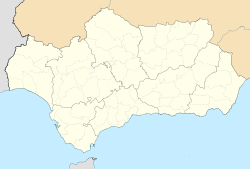world.wikisort.org - Spain
Bailén (archaically known as Baylen in English) is a town in the province of Jaén, Spain.
Bailén | |
|---|---|
Municipality | |
 Parish church of the Incarnation. | |
 Flag  Coat of arms | |
 Bailén Location in Spain  Bailén Bailén (Andalusia)  Bailén Bailén (Spain) | |
| Coordinates: 38°5′N 3°46′W | |
| Country | |
| Autonomous community | |
| Province | Jaén |
| Comarca | Sierra Morena |
| Government | |
| • Mayor | David Padilla Molina |
| Area | |
| • Total | 117.6 km2 (45.4 sq mi) |
| Elevation | 343 m (1,125 ft) |
| Population (2018)[1] | |
| • Total | 17,820 |
| • Density | 150/km2 (390/sq mi) |
| Demonym | Bailenenses |
| Time zone | UTC+1 (CET) |
| • Summer (DST) | UTC+2 (CEST) |
| Postal code | 23710 |
| Website | Official website |
History
Bailén is probably the ancient Baecula, where the Romans, under Scipio the elder, signally defeated the Carthaginians in 209 and 206 B.C. In its neighbourhood, also, in 1212, was fought the great Battle of Las Navas de Tolosa, in which, according to the ancient chroniclers, the Castilians under Alphonso VIII, slew 200,000 Almohads, and themselves only lost 25 men. Although this estimate is absurd, the victory of the Christians was complete.[2]
There is a convent that dates from 729.
In 1808, during the Peninsular War, it was the site of a series of clashes (the Battle of Bailén) at which General Castaños defeated General Pierre Dupont.[3] The capitulation, signed at Andújar by Dupont on the 23rd of July 1808, involved the surrender of 17,000 men to the Spaniards, and was the first severe blow suffered by the French in the Peninsular War.[2]
Economy
The town has many quarries, resulting in a reputation for craft products.
Significant Births
- Felipe de Neve Founder of Los Angeles, California.
- Gregorio Manzano Football coach.
Twin towns
 Móstoles, Spain
Móstoles, Spain Spétses, Greece
Spétses, Greece Yapeyú, Argentina
Yapeyú, Argentina
Notes
- Municipal Register of Spain 2018. National Statistics Institute.
- One or more of the preceding sentences incorporates text from a publication now in the public domain: Chisholm, Hugh, ed. (1911). "Bailén". Encyclopædia Britannica. Vol. 3 (11th ed.). Cambridge University Press. p. 217.
- Chandler, p. 618
References
- Chandler, David G. (1994). The Campaigns of Napoleon. Weidenfeld & Nicolson. ISBN 0-297-81367-6.
External links
На других языках
- [en] Bailén
[es] Bailén
Bailén es una ciudad y municipio español perteneciente a la provincia de Jaén. Bailén está ubicado en la comarca de Sierra Morena, paso natural de las vías de comunicación que enlazan el centro y norte de la península ibérica con el sur.[ru] Байлен
Байлен (исп. Bailén) — населённый пункт и муниципалитет в Испании, входит в провинцию Хаэн, в составе автономного сообщества Андалусия. Муниципалитет находится в составе района (комарки) Сьерра-Морена. Занимает площадь 117,6 км². Население — 18 763 человека (на 2010 год). Расстояние — 39 км до административного центра провинции.Другой контент может иметь иную лицензию. Перед использованием материалов сайта WikiSort.org внимательно изучите правила лицензирования конкретных элементов наполнения сайта.
WikiSort.org - проект по пересортировке и дополнению контента Википедии